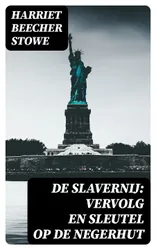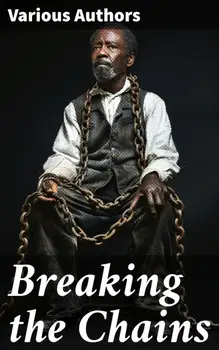Breaking the Chains is a profound anthology that traverses the turbulent waters of slavery from the unique lenses of its contributors. Spanning narratives of perseverance, resistance, and resilience, this collection offers a rich tapestry of literary expressions'Äîmemoirs, autobiographies, and historical accounts. Each piece extends a powerful narrative that not only captures the brutal realities of bondage but also illuminates the indomitable spirit of those who resisted and triumphed over systemic oppression. The compilation stands as a significant scholarly work, presenting a diversified set of artifacts that do not just recount the past but challenge contemporary understandings of freedom and human dignity. The anthology unites voices that have previously echoed through time, yet gain renewed relevance. Figures like Harriet Beecher Stowe offer their abolitionist influence, while Frederick Douglass and Booker T. Washington contribute with eloquent reflections on emancipation and equality. This confluence of perspectives captured within 'Breaking the Chains' aligns with pivotal cultural and literary movements in the fight for civil rights and social justice. The assemblage of these historic narratives enriches the dialogue on freedom and extends the tradition of truth-telling and storytelling that has long been essential to Black literary heritage. Readers are invited to delve into this anthology as an indispensable resource for understanding the multifaceted experiences of slavery and the ongoing struggle for human rights. Offering a unique academic exploration, 'Breaking the Chains' serves as an educational cornerstone for those seeking to comprehend the profound and lasting impact of these harrowing yet inspiring testimonies. It stands as a testament to the power of courage, the richness of varied histories, and the invaluable dialogues fostered through shared stories.

90 Masterpieces You Must Read (Vol.2) : Novels, Poetry, Plays, Short Stories, Essays, Psychology & Philosophy: The Awakening, A Tale of Two Cities, Iliad & Odyssey,War and Peace, The Yellow Wallpaper, Fathers and Sons,The Prince, Peter and Wendy...
Charles Dickens, Jane Austen, Robert Louis Stevenson, Henrik Ibsen, Leo Tolstoy, Ford Madox Ford, E. M. Forster, Honoré de Balzac, Kenneth Grahame, Rabindranath Tagore, George Weedon Grossmith, F. Scott Fitzgerald, Daniel Defoe, Jules Verne, Jonathan Swift, James Fenimore Cooper, George MacDonald, J. M. Barrie, Alexandre Dumas, Homer, Dante, William Dean Howells, Kakuzo Okakura, Gustave Flaubert, Victor Hugo, Stendhal, Walter Scott, Anthony Trollope, Emile Zola, Theodor Storm, Harriet Beecher Stowe, Nathaniel Hawthorne, Henry Fielding, Jerome K. Jerome, Laurence Sterne, Thomas Hardy, Willa Cather, Edith Wharton, Kate Chopin, Sinclair Lewis, W. Somerset Maugham, Henry James, Ivan Turgenev, Nikolai Gogol, Virginia Woolf, Pedro Calderon de la Barca, Johann Wolfgang von Goethe, Friedrich Nietzsche, Benjamin Franklin, Bankim Chandra Chatterjee, Kalidasa, Válmíki, Edgar Allan Poe, Wilkie Collins, Ann Ward Radcliffe, Bram Stoker, Gaston Leroux, H. G. Wells, Joseph Conrad, Lewis Wallace, Washington Irving, Machiavelli, Fyodor Dostoyevsky, Confucius, Laozi, John Milton, P. B. Shelley, W. B. Yeats, Charlotte Perkins Gilman, D.H. Lawrence, George Bernard Shaw, Elizabeth von Arnim, Cao Xueqin, G. K. Chesterton, John Buchan, Edgar Wallace, Nikolai Leskov, Kurt Vonnegut, William Walker Atkinson, Émile Coué
book
The Big Book of Christmas : A Treasure Trove of Holiday Magic
Hans Christian Andersen, Charles Dickens, Louisa May Alcott, Zenith Crescent Moon Press, O. Henry, Mark Twain, Beatrix Potter, William Shakespeare, Harriet Beecher Stowe, Emily Dickinson, Robert Louis Stevenson, Rudyard Kipling, Selma Lagerlöf, Martin Luther, Walter Scott
book
The Wit and Humor of America (Vol. 1-10) : Comedy Anthology: Funny Stories, Poems, Humorous Articles, Fables & Fairy Tales
O. Henry, Mark Twain, Washington Irving, Bret Harte, Nathaniel Hawthorne, Ralph Waldo Emerson, Walt Whitman, Benjamin Franklin, Edward Everett Hale, Henry Wadsworth Longfellow, John Kendrick Bangs, William Dean Howells, Charlotte Perkins Gilman, Henry Ward Beecher, John G. Saxe, James Russell Lowell, Harriet Beecher Stowe, Robert W. Chambers, Edmund Clarence Stedman, Oliver Wendell Holmes, Wallace Irwin, Eugene Field, Anne Virginia Culbertson, John Paul, Lloyd Osbourne, James Montgomery Flagg, Bill Nye, Robert J. Burdette, Wilbur D. Nesbit, Gelett Burgess, James Whitcomb Riley, Frank L. Stanton, Bayard Taylor, Artemus Ward, Elizabeth Stuart Ward, Charles Dudley Warner, Carolyn Wells, Owen Wister
book
The Big Christmas Basket: 200+ Christmas Novels, Stories, Poems & Carols (Illustrated)
Bjørnstjerne Bjørnson, Selma Lagerlöf, Charles Dickens, Mark Twain, Harriet Beecher Stowe, Robert Louis Stevenson, Henry Wadsworth Longfellow, Max Brand, William Wordsworth, Carolyn Wells, Sophie May, Louisa May Alcott, Alphonse Daudet, William John Locke, Guy de Maupassant, Walter Scott, Gustavo Adolfo Bécquer, Benito Pérez Galdós, Armando Palacio Valdés, Susan Anne Livingston Ridley Livingston Sedgwick, Anthony Trollope, Marcel Prévost, Rudyard Kipling, Beatrix Potter, Mary Hartwell Catherwood, Emily Dickinson, Bret Harte, Lucas Malet, Thomas Nelson Page, O. Henry, Saki, François Coppée, Maud Lindsay, Alice Hale Burnett, Walter Crane, André Theuriet, Amy Ella Blanchard, Isabel Cecilia Williams, Amanda M. Douglas, Edgar Wallace, Booker T. Washington, Olive Thorne Miller, Vernon Lee, Anne Hollingsworth Wharton, Kate Upson Clark, Ernest Ingersoll, Willis Boyd Allen, F. L. Stealey, J. M. Barrie, Eleanor H. Porter, Annie F. Johnston, Jacob A. Riis, Elbridge S. Brooks, Edward A. Rand, Florence L. Barclay, E. T. A. A Hoffmann, Harrison S. Morris, Robert E. Howard, Marjorie L. C. C Pickthall, Hans Christian Andersen, William Butler Yeats, Henry van Dyke, Anton Chekhov, Fyodor Dostoevsky, Alfred Lord Tennyson, A. S. Boyd, Juliana Horatia Ewing, Clement Moore, Nora A. Smith, Phebe A. Curtiss, Nellie C. King, Lucy Wheelock, Aunt Hede, Frederick E. Dewhurst, Jay T. Stocking, Anna Robinson, Florence M. Kingsley, M. A. L. L Lane, Elizabeth Harkison, F. E. Mann, Winifred M. Kirkland, Katherine Pyle, Grace Margaret Gallaher, Elia W. Peattie, F. Arnstein, James Weber Linn, Antonio Maré, Jules Simon, Marion Clifford, E. Hale, Georg Schuster, Matilda Betham Edwards, Angelo J. Lewis, Raymond McAlden, Pedro A. de Alarcón, Maxime du Camp
book
Warlock's Play: 550+ Supernatural Mysteries, Macabre & Horror Classics : Black Magic, Sweeney Todd, The Vampyre, Dracula, The Legend of Sleepy Hollow, Frankenstein…
Wilhelm Hauff, Charles Dickens, Mark Twain, Harriet Beecher Stowe, Adelbert von Chamisso, Oscar Wilde, Robert Louis Stevenson, Edgar Allan Poe, William Hope Hodgson, Joseph Sheridan Le Fanu, John Buchan, Louis Tracy, Bram Stoker, Anatole France, Charlotte Brontë, Emily Brontë, Jack London, Henry James, Théophile Gautier, Arthur Conan Doyle, Richard Le Gallienne, Jane Austen, Algernon Blackwood, Ralph Adams Cram, Thomas De Quincey, John Meade Falkner, Guy de Maupassant, Thomas Hardy, William Archer, Daniel Defoe, John Kendrick Bangs, Cleveland Moffett, Brander Matthews, Marie Belloc Lowndes, Sax Rohmer, Horace Walpole, Rudyard Kipling, Lafcadio Hearn, Ambrose Bierce, Frederick Marryat, Ellis Parker Butler, Washington Irving, Leonid Andreyev, David Lindsay, Nathaniel Hawthorne, Grant Allen, Arthur Machen, Wilkie Collins, William Makepeace Thackeray, Thomas Peckett Prest, James Malcolm Rymer, Fergus Hume, Edward Bellamy, Walter Hubbell, S. Mukerji, Charlotte Perkins Gilman, Leopold Kompert, Richard Marsh, Florence Marryat, Catherine Crowe, Marjorie Bowen, John William Polidori, Vincent O'Sullivan, H. G. Wells, Robert W. Chambers, W. W. Jacobs, M. P. Shiel, E. F. Benson, Jerome K. Jerome, M. R. James, E. T. A. Hoffmann, George W. M. Reynolds, H. P. Lovecraft, Robert E. Howard, Edith Nesbit, Sabine Baring-Gould, William Thomas Beckford, Francis Marion Crawford, Mary Elizabeth Braddon, Mary Louisa Molesworth, Mary E. Wilkins Freeman, Nikolai Gogol, Mary Shelley, Elizabeth Gaskell, Gertrude Atherton, Edward Bulwer-Lytton, Frank R. Stockton, A. T. Quiller-Couch, Olivia Howard Dunbar, Ann Radcliffe, Louisa M. Alcott, Amelia B. Edwards, Leonard Kip, Matthew Gregory Lewis, Fitz-James O'Brien, Katherine Rickford, Bithia Mary Croker, Catherine L. Pirkis, Émile Erckmann, Alexandre Chatrian, Pedro De Alarçon, J. K. Huysmans, H. H. Munro (Saki), Pliny the Younger, Helena Blavatsky, Villiers l'Isle de Adam, William F. Harvey, Fiona Macleod, William T. Stead, Gambier Bolton, Andrew Jackson Davis, Nizida, Walter F. Prince, Chester Bailey Fernando
book
Horror Anthology : 500 Supernatural Mysteries, Macabre Tales & Horror Classics
Wilhelm Hauff, Charles Dickens, Mark Twain, Harriet Beecher Stowe, Adelbert von Chamisso, Oscar Wilde, Robert Louis Stevenson, Edgar Allan Poe, William Hope Hodgson, Joseph Sheridan Le Fanu, John Buchan, Louis Tracy, Bram Stoker, Anatole France, Charlotte Brontë, Emily Brontë, Jack London, Henry James, Théophile Gautier, Arthur Conan Doyle, Richard Le Gallienne, Jane Austen, Algernon Blackwood, Ralph Adams Cram, Thomas De Quincey, John Meade Falkner, Guy de Maupassant, Thomas Hardy, William Archer, Daniel Defoe, John Kendrick Bangs, Cleveland Moffett, Brander Matthews, Marie Belloc Lowndes, Sax Rohmer, Horace Walpole, Rudyard Kipling, Lafcadio Hearn, Ambrose Bierce, Frederick Marryat, Ellis Parker Butler, Washington Irving, Leonid Andreyev, David Lindsay, Nathaniel Hawthorne, Grant Allen, Arthur Machen, Wilkie Collins, William Makepeace Thackeray, Thomas Peckett Prest, James Malcolm Rymer, Fergus Hume, Edward Bellamy, Walter Hubbell, S. Mukerji, Charlotte Perkins Gilman, Leopold Kompert, Richard Marsh, Florence Marryat, Catherine Crowe, Marjorie Bowen, John William Polidori, Vincent O'Sullivan, H. G. Wells, Robert W. Chambers, W. W. Jacobs, M. P. Shiel, E. F. Benson, Jerome K. Jerome, M. R. James, E. T. A. Hoffmann, George W. M. Reynolds, H. P. Lovecraft, Robert E. Howard, Edith Nesbit, Sabine Baring-Gould, William Thomas Beckford, Francis Marion Crawford, Mary Elizabeth Braddon, Mary Louisa Molesworth, Mary E. Wilkins Freeman, Nikolai Gogol, Mary Shelley, Elizabeth Gaskell, Gertrude Atherton, Edward Bulwer-Lytton, Frank R. Stockton, A. T. Quiller-Couch, Olivia Howard Dunbar, Ann Radcliffe, Louisa M. Alcott, Amelia B. Edwards, Leonard Kip, Matthew Gregory Lewis, Fitz-James O'Brien, Katherine Rickford, Bithia Mary Croker, Catherine L. Pirkis, Émile Erckmann, Alexandre Chatrian, Pedro De Alarçon, J. K. Huysmans, H. H. Munro (Saki), Pliny the Younger, Helena Blavatsky, Villiers l'Isle de Adam, William F. Harvey, Fiona Macleod, William T. Stead, Gambier Bolton, Andrew Jackson Davis, Nizida, Walter F. Prince, Chester Bailey Fernando
book
The Greatest Literary Classics Of All Time : 150 Books: Romeo and Juliet, Emma, Vanity Fair, Middlemarch, Tom Sawyer, Faust, Notre Dame de Paris…
Johann Wolfgang von Goethe, Stendhal, Jules Verne, Gustave Flaubert, Lewis Carroll, Theodor Storm, Henrik Ibsen, Charles Dickens, Plato, Honoré de Balzac, Mark Twain, Harriet Beecher Stowe, Rabindranath Tagore, Fyodor Dostoyevsky, Walt Whitman, Niccolò Machiavelli, Oscar Wilde, Robert Louis Stevenson, James Fenimore Cooper, Edgar Allan Poe, William Shakespeare, Giovanni Boccaccio, Confucius, George MacDonald, Bram Stoker, Charlotte Brontë, Anne Brontë, Emily Brontë, Henry David Thoreau, Jack London, Henry James, Louisa May Alcott, Victor Hugo, Arthur Conan Doyle, Frances Hodgson Burnett, Joseph Conrad, Jane Austen, Herman Melville, George Eliot, Laurence Sterne, Thomas Hardy, Jonathan Swift, Edith Wharton, Benito Pérez Galdós, Daniel Defoe, Henry Fielding, Alexandre Dumas, Rudyard Kipling, William Dean Howells, Kalidasa, Kenneth Grahame, Marcel Proust, Washington Irving, Juan Valera, Willa Cather, Nathaniel Hawthorne, Homer, Gaston Leroux, Charles Baudelaire, William Makepeace Thackeray, Voltaire, Kate Chopin, Apuleius, John Milton, Charlotte Perkins Gilman, Frederick Douglass, Laozi, John Keats, James Joyce, Ann Ward Radcliffe, Kahlil Gibran, Kakuzo Okakura, Soseki Natsume, Princess Der Ling, L. Frank Baum, H. G. Wells, W. B. Yeats, J. M. Barrie, G. K. Chesterton, T. S. Eliot, L. M. Montgomery, C. S. Lewis, D. H. Lawrence, E. M. Forster, H. P. Lovecraft, F. Scott Fitzgerald, Marcus Aurelius, Friedrich Nietzsche, Lewis Wallace, Ivan Turgenev, Anton Chekhov, Leo Tolstoy, Nikolai Gogol, Sir, George Bernard Shaw, Miguel de Cervantes, Mary Shelley, Cao Xueqin, Emile Zola, Válmíki, Bankim Chandra Chatterjee, P. B. Shelley, Elizabeth von Arnim, Herman Hesse, Dante, Pedro Calderon de la Barca, Sun Tzu, Inazo Nitobé, George Weedon Grossmith, Willkie Collins
book
The Big Book of Christmas Novels, Stories, Myths & Carols : 450+ Titles in One Edition: A Christmas Carol, Little Women, Silent Night, The Gift of the Magi…
Bjørnstjerne Bjørnson, Selma Lagerlöf, Charles Dickens, Mark Twain, Harriet Beecher Stowe, Martin Luther, Robert Louis Stevenson, William Shakespeare, Henry Wadsworth Longfellow, Max Brand, William Wordsworth, Carolyn Wells, Charles Mackay, John Addington Symonds, Sophie May, Louisa May Alcott, Henry Van Dyke, Arthur Conan Doyle, Frances Hodgson Burnett, Andrew Lang, Frances Ridley Havergal, Alphonse Daudet, William John Locke, Walter Scott, Gustavo Adolfo Bécquer, John Leighton, Booth Tarkington, Ralph Henry Barbour, Benito Pérez Galdós, Ruth McEnery Stuart, Alice Duer Miller, Elizabeth Cleghorn Gaskell, Armando Palacio Valdés, William Morris, Anthony Trollope, Marcel Prévost, Rudyard Kipling, Beatrix Potter, Robert Herrick, Mary Hartwell Catherwood, Emily Dickinson, Bret Harte, Hamilton Wright Mabie, Meredith Nicholson, Lucas Malet, Ellis Parker Butler, Washington Irving, Isaac Watts, James Russell Lowell, Willa Cather, Nathaniel Hawthorne, James Whitcomb Riley, Thomas Nelson Page, O. Henry, Phillips Brooks, Saki, Cyrus Townsend Brady, William Makepeace Thackeray, Mary Stewart Cutting, Sarah Orne Jewett, François Coppée, Oliver Bell Bunce, Susan Coolidge, Samuel McChord Crothers, Maud Lindsay, Alice Hale Burnett, Walter Crane, André Theuriet, Amy Ella Blanchard, Isabel Cecilia Williams, Evaleen Stein, Nell Speed, Amanda M. Douglas, Edgar Wallace, George Wither, Booker T. Washington, Olive Thorne Miller, Margaret Sidney, William Douglas O'Connor, Vernon Lee, Anne Hollingsworth Wharton, Henry Vaughan, Eliza Cook, Kate Upson Clark, Ben Jonson, Ernest Ingersoll, Frank Samuel Child, Willis Boyd Allen, Georgianna M. Bishop, Edward Thring, F. L. Stealey, James Selwin Tait, Tudor Jenks, L. Frank Baum, C. N. Williamson, A. M. Williamson, J. M. Barrie, Eleanor H. Porter, Annie F. Johnston, Jacob A. Riis, S. Weir Mitchell, Elbridge S. Brooks, Edward A. Rand, W. H. H. Murray, Florence L. Barclay, E. T. A. Hoffmann, Harrison S. Morris, Robert E. Howard, Marjorie L. C. Pickthall, Sarah P. Doughty, Hans Christian Andersen, William Butler Yeats, Richard Watson Gilder, Lucy Maud Montgomery, Anton Chekhov, Mary Elizabeth Braddon, Mary Louisa Molesworth, Leo Tolstoy, Fyodor Dostoevsky, Cecil Frances Alexander, Mary E. Wilkins Freeman, Margaret Deland, William Drummond, Robert Southwell, Reginald Heber, Lord, George Macdonald, A. S. Boyd, Maxime Du Camp, Mary Austin, Juliana Horatia Ewing, Guy De Maupassant, Brothers Grimm, Clement Moore, Susan Anne Livingston, Ridley Sedgwick, Nora A. Smith, Phebe A. Curtiss, Nellie C. King, Lucy Wheelock, Aunt Hede, Frederick E. Dewhurst, Jay T. Stocking, Anna Robinson, Florence M. Kingsley, M. A. L. Lane, Elizabeth Harkison, Raymond Mcalden, F. E. Mann, Winifred M. Kirkland, Katherine Pyle, Grace Margaret Gallaher, Elia W. Peattie, F. Arnstein, James Weber Linn, Antonio Maré, Pedro A. De Alarcón, Jules Simon, Marion Clifford, E. E. Hale, Georg Schuster, Matilda Betham Edwards, Angelo J. Lewis, William Francis Dawson, Christopher North, Alfred Domett, Dinah Maria Mulock, James S. Park, Edmund Hamilton Sears, Edmund Bolton, C.s. Stone, Harriet F. Blodgett, John G. Whittier, Christian Burke, Emily Huntington Miller, Cyril Winterbotham, Enoch Arnold Bennett, John Punnett Peters, Laura Elizabeth Richards
book
HALLOWEEN Ultimate Collection: 200+ Mysteries, Horror Classics & Supernatural Tales : An Enthralling Collection of Horror, Mystery, and Supernatural Tales
Wilhelm Hauff, Charles Dickens, Mark Twain, Harriet Beecher Stowe, Edgar Allan Poe, William Hope Hodgson, John Buchan, George MacDonald, Bram Stoker, Anatole France, Jack London, Henry James, Théophile Gautier, Arthur Conan Doyle, Richard Le Gallienne, Ralph Adams Cram, Guy de Maupassant, Thomas Hardy, William Archer, Daniel Defoe, Brander Matthews, Lafcadio Hearn, Ambrose Bierce, Ellis Parker Butler, Washington Irving, Nathaniel Hawthorne, Grant Allen, Arthur Machen, Wilkie Collins, Thomas Peckett Prest, James Malcolm Rymer, Fergus Hume, Walter Hubbell, Leopold Kompert, Florence Marryat, John William Polidori, Vincent O'Sullivan, W. Jacobs, M. P. Shiel, E. F. Benson, M. R. James, H. P. Lovecraft, Francis Marion Crawford, Mary Shelley, Margaret Oliphant, Frank R. Stockton, A. T. Quiller-Couch, Leonard Kip, Katherine Rickford, Bithia Mary Croker, Catherine L. Pirkis, Pedro De Alarçon, Pliny the Younger, Helena Blavatsky, Villiers de l'Isle Adam, William F. Harvey, Fiona Macleod, William T. Stead, Gambier Bolton, Andrew Jackson Davis, Nizida, Walter F. Prince, Chester Bailey Fernando
book
50 Clásicos que Debes Leer Antes de Morir: Un viaje literario por los tesoros de la literatura universal
Dante Alighieri, Aristóteles, Jane Austen, Charles Baudelaire, Giovanni Boccaccio, Anne Brontë, C. Collodi, James Fenimore Cooper, Fedor Mikhaïlovitch Dostoïevski, Arthur Conan Doyle, Alexandre Dumas, José de Espronceda, Gustave Flaubert, Sigmund Freud, Benito Pérez Galdós, Kahlil Gibran, Johann Wolfgang Goethe, Johann Wolfgang von Goethe, Victor Hugo, Thomas Hardy, Nathaniel Hawthorne, Vicente Blasco Ibáñez, Washington Irving, James Joyce, Mariano José de Larra, Jack London, Federico García Lorca, H. P. Lovecraft, Antonio Machado, Gustav Meyrink, John Stuart Mill, Amado Nervo, Friedrich Nietzsche, Solomon Northup, Alexander Sergeyevich Pushkin, Francisco de Quevedo, Walter Scott, William Shakespeare, Robert Louis Stevenson, Harriet Beecher Stowe, Jonathan Swift, Mark Twain, Miguel de Unamuno, Ramón María del Valle-Inclán, Julio Verne, Virginia Woolf, Bookish
book
Lady Byron Vindicated
Harriet Beecher Stowe
audiobook
De Slavernij: Vervolg en Sleutel op De Negerhut
Harriet Beecher Stowe
book
